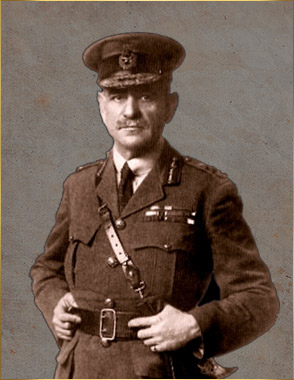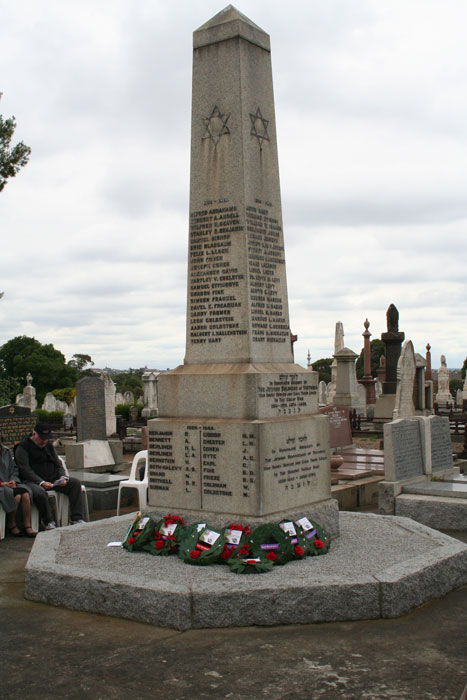Victorian Association of Jewish Ex & Servicemen & Women Australia Incorporated
Founding Member General Sir John Monash GCMG KCB VD
Nunes
Surname
Nunes
First names
Raphael "Ray"
Rank
Gunner
Service No.
70035
Date of Death
1/7/1999
Hebrew Date
17 Tamuz 5759
Hebrew Date
י״ז בְּתַמּוּז תשנ״ט
Age at Death
82
How Died
Where Died
New Zealand
Cemetery
Service Details
2nd Division Artillery, Second New Zealand Expeditionary Force
Served
Solomon Islands
Occupation
Fruiterer
Age at Enlistment
Place of Enlistment
Christchurch, Canterbury, New Zealand
Locality on Enlistment
909 Colombo Street, Christchurch, New Zealand
Religion
Jewish
Gender
Male
Date of Enlistment
Date of Discharge
Country of Enlistment
New Zealand
Notes
Born 30/10/1916. Comrades : the death of Ray Nunes. For decades the sight of an old man in an oversized jersey, excoriating capitalist roaders from his soapbox, was something Auckland University students knew well. Peter Malcouronne pays tribute to the heroic communist fighter, Ray Nunes. Everyone at Auckland University knew him, if not by name then by declamation. Ray Nunes, the chairman of the Workers Party of New Zealand, “the only true worker’s party”, would stand by the library overpass, atop a wooden crate, hawking copies of The Spark, the WPNZ’s monthly magazine. “Every day he was there,” says 28-year-old arts student Daryl Godfrey. He was part of the architecture… a legend. Campus is not going to be the same without him.” For on July 1, Chairman Nunes died of a heart attack, aged 82. Daphna Whitmore, Nunes’s great niece, and secretary of the WPNZ, leafs through a bloated manila folder, stuffed with messages of condolence and regret. The Central Committee of the Communist Party of the Philippines salutes “Comrade Nunes … a devoted Communist [and] outstanding proletarian revolutionary fighter”. The clunkily monikered Communist Party of India (Marxist-Leninist) [People’s War] pays “humble revolutionary homage to this veteran communist leader”, while the Workers Party of Belgium notes that it was “a remarkable achievement to have formed the Workers Party of New Zealand at the age of 74”. Whitmore puts the folder down and fondly gives the potted history of her great-uncle and “great friend”. Born in Whitechapel, London in 1916, the youngest of seven children. Family were East London Jews, came out to New Zealand when Ray was six. Left school in the middle of the Depression. Would have been about 13. Sold encyclopedias door-to-door to bolster the family coffers. Served in the Solomons with 3rd New Zealand Division. Worked in factories after the war, and spent 10 years managing a communist bookshop. No kids, never married. Moved to a small pensioner flat in Blockhouse Bay. Broke his wrist ice-skating when he was in his seventies. Loved Beethoven and Mendelssohn; couldn’t stand the Beatles — “the end of popular music”. Drove an old Mazda like a loon. Nunes would often be joined by Whitmore on the stump. They made a good if rather odd team, proselytising not only to students, but to the hoi polloi of Otara and Avondale’s flea-markets and to the suits of Queen St. The beautiful young woman with the striking cheekbones would brandish a copy of The Spark as the frail old communist in his too-big cream jersey and straw hat railed away in his distinctive staccato, eviscerating Labour Party traitors, trade union collaborators and other apostates. Whitmore and her great-uncle became staunch comrades. “We rang each other every day for the last 13 years.” They’d talk for hours at a time. About Marxism. About Stalin, “a great Marxist-Leninist”, and the mistakes he’d made. About Nune’s “lifetime of struggle”. He joined the New Zealand Communist Party during the Depression, appalled at the injustice and suffering around him. Then came World War II. “He told me this story about a mutiny,” says Whitmore. “It’s a piece of New Zealand history that hasn’t been recorded.” Nunes led a protest against dreadful conditions in a half-completed army camp. “He protested against the H-Bomb tests in the Pacific in 1954… was on the first anti-Vietnam war demonstration in 1966. There were only three people on it, He told that to me as an example of how small things can grow.” Or, as Mao famously said, and The Spark declares on its mast-head: “A single spark can start a prairie fire.” The New Zealand Communist Party’s denunciation of Mao and its professed allegiance to Enver Hoxha, the bizarre Albanian leader WHO??? Was too much for Nunes. He resigned in 1988 and set up his own party two years later — the Workers Party of New Zealand. This is at a time when most of the world had consigned communism to the dustbin of history. “In ’91, when we started, people would walk past and say, ‘Communism’s dead,’” says Whitmore. “Well people don’t say that so much more. Open slather capitalism hasn’t turned out to be so nice.” Nunes was in there for the long haul. “He thought Marxism was inevitable, though how long it’d take to arrive depended on how much people did. It might take 500 years if we don’t do anything about it. He wasn’t a great one for speculating ‘what-if’. He understood that in New Zealand… it was a non-revolutionary situation.” Nunes would make his own theoretical contribution, despite poor health — a heart attack when he was about 50, a bypass in 1973, another in 1989, during which he had several more attacks on the operating table. In 1995, he collapsed at a meeting on Chechnya. “I did CPR on him until the ambulance came,” says Whitmore. “It took 20 minutes for them to come. But then he pulled out of that and was fine. Ideological fervour kept him going.” The day Nunes died, he was back in hospital for a minor ailment. “I saw him that morning at 11 and then I went back at five to see him, ’cause he was proof-reading The Spark. Then I got a call that night to say that he’d died… he’d had a heart attack. It was a shock although it shouldn’t have been.” Whitmore opens the folder again. Jock Barnes, the legendary leader of the watersiders, quotes Shakespeare: “His life was gentle but the elements so mixed in him that nature might say to all the world — this was a man.” Jim Windsor, “a comrade from Wellington”, recognises Nunes’s management of the “party bookshop, Modern Books, in Manners St”. Nunes made “a deep impact upon Victoria University students”, Windsor writes, helping “many to work their way through the bourgeois fog”.

 John Monash (Monasch) born
in Melbourne, Australia on 27 June 1865, the son of
German Polish Jewish migrants, can be researched in any
military history encyclopaedia or in fact by just
‘Googling’ his name on the internet. His history
and list of achievements are long and far too many to detail
in this brief summary. However, might I say that reading his
history is well worth the effort and I can assure you that
his deeds will amaze you. I have found that the deeds are
better labelled on more than one man and in more than one
lifetime.
John Monash (Monasch) born
in Melbourne, Australia on 27 June 1865, the son of
German Polish Jewish migrants, can be researched in any
military history encyclopaedia or in fact by just
‘Googling’ his name on the internet. His history
and list of achievements are long and far too many to detail
in this brief summary. However, might I say that reading his
history is well worth the effort and I can assure you that
his deeds will amaze you. I have found that the deeds are
better labelled on more than one man and in more than one
lifetime. An
announcement was made in the weeks leading up to the
Centenary of ANZAC by Judy Landau, President VAJEX Aust.
She stated that it gave her great delight to announce
that VAJEX Aust (Victorian Association of Jewish Ex
& Servicemen & Women Australia Inc) has
successfully raised the required funds to build a new
Victorian Jewish Memorial after the style of the
historic Memorial located in the Jewish section of the
Melbourne General Cemetery. After an extensive two year
process, Judy has single-handedly sought letters of
support, raised the funds, and obtained approval from
the City of Port Phillip.
An
announcement was made in the weeks leading up to the
Centenary of ANZAC by Judy Landau, President VAJEX Aust.
She stated that it gave her great delight to announce
that VAJEX Aust (Victorian Association of Jewish Ex
& Servicemen & Women Australia Inc) has
successfully raised the required funds to build a new
Victorian Jewish Memorial after the style of the
historic Memorial located in the Jewish section of the
Melbourne General Cemetery. After an extensive two year
process, Judy has single-handedly sought letters of
support, raised the funds, and obtained approval from
the City of Port Phillip.